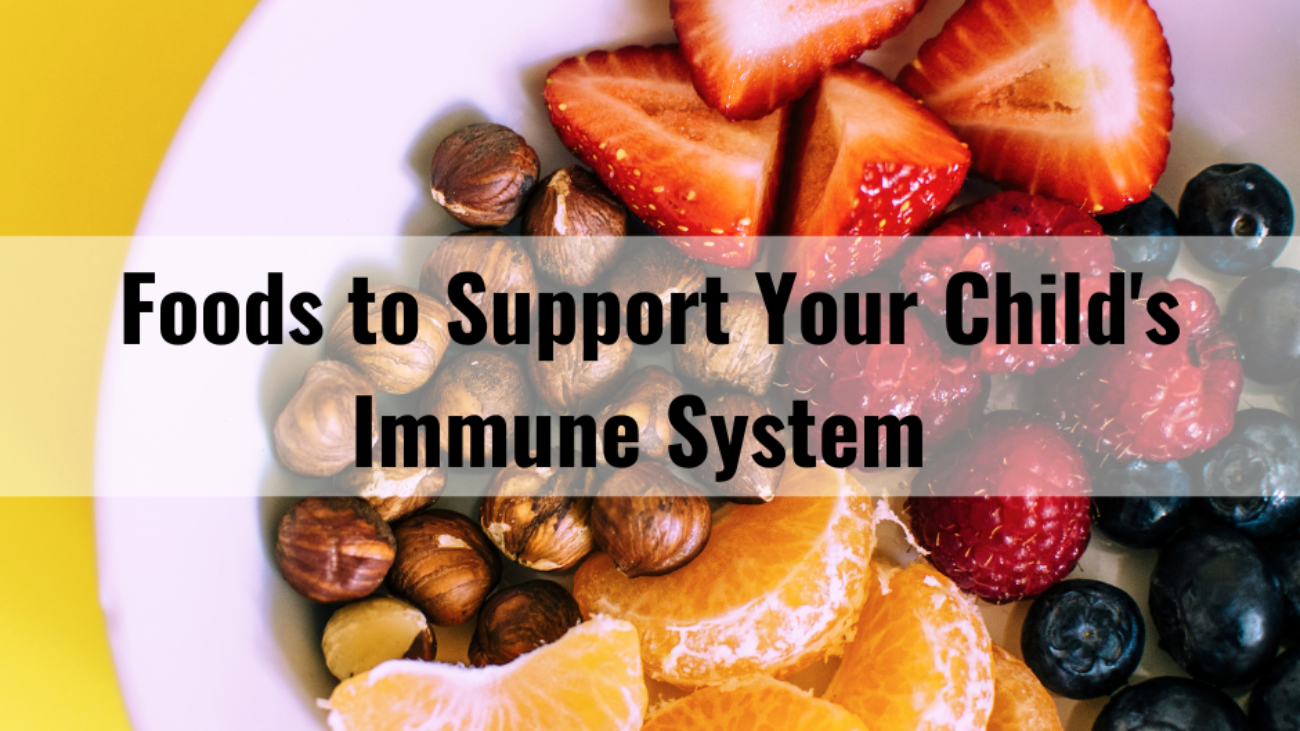The immune system plays a very important role in your overall health (and the health of your children). It defends against viruses and bacteria. It’s made up of interconnected white blood cells, antibodies, bone marrow, the spleen, thymus and lymphatic system, which work together in harmony to find and destroy pathogens (the things that cause illness).
With Covid-19 in the news, you’ve probably seen many articles and blog posts about “how to boost your child’s immune system”. As a parent, I can imagine that you’re especially curious about this if you have children who are in school, as we want to protect our children from all the viruses or bacteria going around them.
But here’s the thing: the idea of boosting the immune system with supplements or specific foods is misleading and scientifically inaccurate (here). Do you know an overactive immune system is linked with autoimmune diseases such as lupus or multiple sclerosis. “Immune boosting” is a marketing term, not a medical term.
THERE IS NO SINGLE PRODUCT THAT CAN BOOST IMMUNITY
Scientists are still a long way from understanding the complex interplay of parts that allow the immune system to perform at its optimum level, which means there’s no product you can take to “boost” it. Instead, it’s important to focus on supporting your (and your childrens’) immune systems so they function normally. There are many things we can do to support immunity, such as getting enough sleep, being physically active, minimizing stress and eating nutritious foods. As a busy mom, I love finding foods that are not only nutritious and convenient, but also immune supporting.
The easiest way to get these nutrients is by eating a healthy and balanced diet.
Certain nutrients, such as zinc, selenium, iron, protein, vitamins A, C, D and E are critical for the function of immune cells. However, I can’t promise you that you can totally shield your children from getting sick by eating foods with these nutrients. In fact, you can build up your children’s immune systems with nutrient-dense foods. Certain foods have the exact nutrients that can help your children’s immune systems be as strong as possible, so when they are exposed to the inevitable germs, they are ready to fight.
FOODS CONTAIN THESE IMPORTANT NUTRIENTS
Orange vegetables and fruits
Carrots, sweet potatoes, pumpkin and cantaloupe are among the best sources of beta-carotene, a precursor of vitamin A. Beta-carotene has several health benefits, including the antioxidant activity that protects cells from free radical damage and help enhance immune function (here). In fact, beta-carotene plays a role in making white blood cells, which are responsible for hunting down and quashing viruses. Pairing these foods with a healthy fat, such as olive oil, avocado, or nuts and seeds, can help the body absorb them better.
Berries
Berries are full of antioxidants, which help your body fight oxidative stress caused by free radicals. This helps keep our immune system fighting! There are many different berries you should try to include in your children’s diet: strawberries, blueberries, raspberries, cranberries, and blackberries, to name a few. Don’t worry; when berries aren’t in season frozen berries are just as nutritious. You can add them to yogurt and oatmeal, or eat them as a nourishing snack.
Dark leafy greens
Choose kale, spinach, chard, arugula or collards. Dark leafy greens are high in carotenoids (similar to beta carotene), and have similar immune-supporting effects. If your children not a fan of salads? Use leafy greens in smoothies, muffins or stir-fry.
Nuts
I’m often asked which nut to eat and I say, “mix it up!” Each nut has a different nutritional value, so choose a variety for the best immune support. Almonds, peanuts and hazelnuts contain vitamin E, which helps increase T-cell count (T-cells directly kill infected host cells and regulate immune responses) (here). Walnuts are significantly higher in omega-3 fat than any other nut. Enjoy some trail mix, or add nuts to salads, pasta or cereal. Or enjoy them in a granola bar or energy ball. Nuts can be choking hazard for babies and young toddlers, so make sure to serve your little one slivered or sliced almonds, or natural nut butters spread thinly on toast.
Seeds
Serve your children a variety of seeds, such as pumpkin, sunflower, sesame, hemp, and flax seeds, to support their immune systems. By eating a wide variety of seeds, you’ll be getting vitamin E, zinc, and omega 3 fatty acids, all of which help the immune system fight off invading bacteria and viruses. You can add seeds to smoothies, yogurt and salads, spread pumpkin or sunflower seed butter thinly on toast.
Oatmeal
Oats contain immune-supporting nutrients like selenium and zinc. But they also contain a special type of fibre called beta-glucan, which increases immune defense by enhancing macrophages (cells that detect and destroy bacteria and viruses) (here). Start your day with oatmeal.
Eggs
Protein is needed for proper immune system functioning, and eggs are the gold standard for their high-quality protein. When scientists measure protein quality – known as “biological value,” it’s often evaluated compared to eggs, which are given the perfect score of 100 (here). Eggs are also a source of immune-supporting selenium and vitamins A, D and E. So, scramble up a few eggs for breakfast today.
Fish
Fatty fish such as salmon, tuna, trout or sardines are excellent choices. They contain a winning combination of vitamin D and omega-3 fats, which both support the immune system. Vitamin D deficiency is associated with an increased susceptibility to infection (here), and omega-3 fats are part of the structure of all immune cells (here). Try canned tuna in a sandwich; enjoy some salmon sushi roll; or try a bagel with cream cheese and smoked salmon or trout.
Fermented foods
Choose kefir, fermented vegetables (sauerkraut or kimchi), kombucha or yogurt made with active cultures. These foods contain probiotics, which mediate and regulate the immune system (here). Researchers are still trying to figure out which specific probiotic strains to use for different health problems, and the pieces of this puzzle remain incomplete. If a specific probiotic is marketed as an immune-booster, don’t believe the hype. Science isn’t there yet.
Tumeric
You know that perfect buttercup-yellow hue of mustard? That comes from turmeric, a spice that contains curcumin, which has been linked to an enhanced immune response. There’s one problem. Curcumin is unstable and not well absorbed by the body. However, researchers found a solution: when using turmeric, add a dash of black pepper. It helps increase the bioavailability of curcumin by 2000% (here) Try turmeric in stir-fries, curries, stew or make a turmeric latte, known as golden milk.
IN ADDITION TO WHAT YOU DO EAT, IT’S ALSO IMPORTANT TO GET YOUR BODY HYDRATED
Staying well hydrated can provided just the right balance for hormones, enzymes and cells to function properly, especially Malaysia’s weather is extremely “hot” and humid. Also, it reduces lung and nasal secretions so that your body can efficiently move virus and irritants out of your body instead of getting stuck inside where they can multiply in a nice cozy host (you).
WHAT ABOUT PROBIOTIC SUPPLEMENTS
Giving your child a probiotic supplement isn’t the answer. There’s just not enough research out there on various strains of probiotics and what their functions are in the body. Probiotic supplements won’t prevent infections from happening, and the risk in taking them is that each and every probiotic strain has a specific use and may actually suppress the immune system, which could cause problems.
BOTTOM LINE
Don’t stress about loading your children up with specific immune-boosting foods or a whole bunch of vitamins and supplements during flu season (or any time of the year), because there’s no such thing, and it turns we don’t want to “boost the immune system” either!
Instead, focus on staying nourished with balanced nutrient-rich meals and snacks, including the foods mentioned above.
Did you know that I offer personalized one-on-one nutrition counselling for children and families? If this is something you’s like to learn more about, check out my service.



